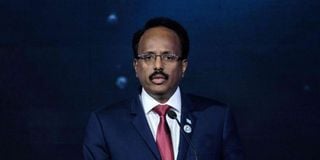Somali leaders gather for make-or-break elections meeting

Somalia's President Mohamed Abdullahi Farmaajo delivers a speech during the Sustainable Blue Economy Conference at KICC in Nairobi, Kenya, on November 26, 2018.
What you need to know:
- President Farmaajo’s term formally expired on February 8 but the country’s top leaders have been unable to implement an electoral deal reached on September 17, 2020 to run an indirect election.
Somalia’s top leaders have gathered in Mogadishu in a crucial meeting that could make or break talks on an electoral calendar.
The meeting led by President Mohamed Farmaajo includes leaders from all the five federal states.
It is one of the latest moves by Farmaajo, who, for the last three weeks, has failed to have all the leaders attend the meeting, with some protesting against his alleged high-handedness.
On Saturday, they gathered at the ‘Big Tent,’ a large makeshift structure inside the highly guarded airport perimeter of the Aden Adde International Airport.
President Farmaajo, Prime Minister Mohamed Hussei Roble, the five presidents of the Federal Member States (FMS); Said Abdulahi Deni of Puntland and Ahmed Abdi Qoorqoor of Galmudug are among those attending the meeting.
Others are Ali Gudlawe Hussein of Hirshabelle, Abdiaziz Hassan Laftagareen of South West, Ahmed Mohamed Islam Madobe of Jubbaland and the Mayor of Mogadishu, Omar Mohamed Filish.
Sources told the Nation that Saturday’s talks are centred on the agenda of the main discussions that will be held after the parties agree on meeting procedures.
It was indicative of the kind of climate of mistrust that has prevented the parties from agreeing.
Election modality
President Farmaajo’s term formally expired on February 8 but the country’s top leaders have been unable to implement an electoral deal reached on September 17, 2020 to run an indirect election.
The leaders present at the ‘Big Tent’ are the same one who agreed on an indirect election modality for Somalia, paving the way for 101 delegates to elect each of the 275 legislators to the Lower House of Somalia’s bicameral Parliament; as per that September 17 Agreement.
The delegates will be selected from sub-clans the MPs will eventually represent.
The 54 senators to the Upper House of Parliament will be elected by the Parliaments of the Federal Member States.
The indirect election modality was agreed after the sides disagreed on a one-man, one-vote mode proposed by the FGS.
But they haven’t agreed on one exact venue, specially in Jubaland; nomination of electoral management teams including those for representatives of breakaway Somaliland region; as well as controversial deployment of Somalia National Army troops to federal states.
Consensus
Under pressure from donors, these leaders had in fact been in Mogadishu since early March when they still disagreed on the agenda.
The Saturday meeting means they are expected to agree on the mechanism to handle the election modality agreed last year.
Somalia’s parliamentary election was initially scheduled for November and December 2020, but is to be held this year if the stakeholders finally sign an agreement.
It appears that the Somali leaders who have failed to hold meetings since last year had to obey suggestions from the Horn of Africa country’s international partners, that urged them to quickly hold meetings and pave the way for elections.
Mr James Swan, Special Representative of the Secretary-General to Somalia, urged Somalis to resolve their differences on the basis of what they had agreed last year.
“The consensus-based September 17 model offers the best available option to proceed quickly to an electoral process for selection of members of Parliament, senators and the President,” Swan told the UN Security Council by virtual means on February 22.





